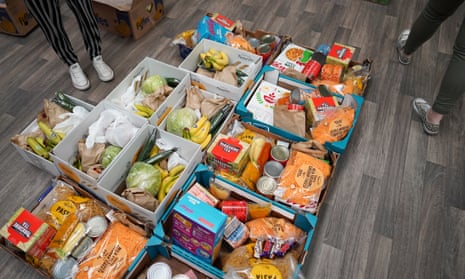It is a snapshot of a more abstemious nation, as staying at home and being unable to eat out means Britons are making their food go further and throwing less away.
Consumers are rising to the challenge of a “lockdown larder” as a result of the pandemic, and ignoring recommendations on best-before and use-by labels and piling less food on to their plates, new research has revealed.
Cooking from scratch, having “virtual” dinner parties online, and eating more family meals together are some of the positive shifts in shopping and cooking behaviour under way in households across the UK since restaurants and pubs closed, according to a survey by the environmental charity Hubbub.
Yet the findings also reveal that many are struggling to put meals on the table and are worried about food, with increasing numbers turning to food banks for the first time.
Overall, 90% of consumers polled earlier in April say their shopping and cooking habits have changed since the coronavirus lockdown started. More than half (57%) admit they value food more now since the restrictions kicked in, with 43% enjoying it more.
In the drive to eke out the contents of their fridges and larders, one in six are paying less attention to use-by dates, eating more out-of-date food than usual. One respondent retrieved a can of beans from 1989 at the back of their cupboard. Others used up a can of coconut milk six years past its sell-by date and a six-year-old bag of pasta – with no ill effects. Portion control also plays a part, with 27% serving up more accurate portion sizes and one in four leaving less on the plate.
Fears that the surge in panic buying and stockpiling before the lockdown would lead to an increase in food waste levels appear not to have materialised. Almost half of people (48%) said they were throwing away less food and only 5% were throwing away more.
Of those wasting less, more than half (51%) said they were planning meals more carefully (51%) and getting better at using up their leftovers. Consumers are also making better use of their freezer, with about a third using it more and freezing a wider variety of foods.
Trewin Restorick, chief executive of Hubbub, said: “At what is a deeply troubling time, it’s encouraging to see some really positive changes taking place in households across the country.
“Families are eating together more, young people are learning to cook, people are planning meals better and using up leftovers. However, it’s concerning to see some of the downsides of food restrictions impacting on the health of people’s diets and I was horrified by the recent report from the Food Foundation, which showed that 3 million people have gone full days without meals since lockdown started.”
Despite the generally positive experience of reconnecting with food, nearly half said they were more worried about food than before and a similar proportion were anxious about the extra cost of putting food on the table.
The consumer group Which? advises that while the rules can be bent for some products, those on fresh and processed meat, poultry and fish should not. Anyone classed as vulnerable or with underlying health conditions should also adhere to the dates on the labels. Unlike use-by dates, best-before labels are put on foods as a quality indication to show that though they are no longer at their best they are still safe enough to eat.
